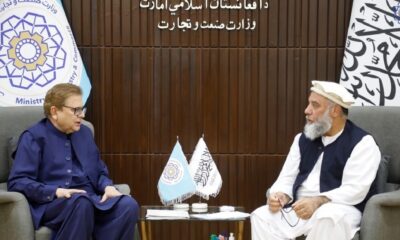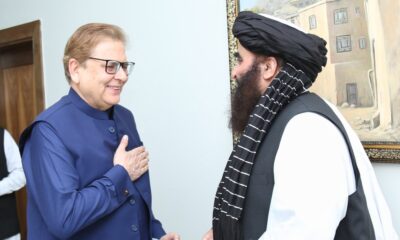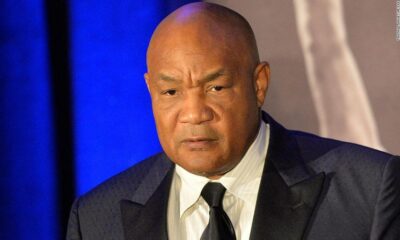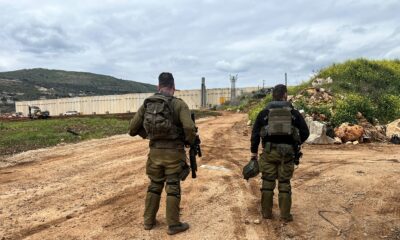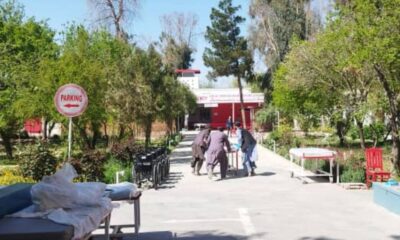Regional
Sri Lankans elect Marxist-leaning Dissanayake as president to fix economy
About 75% of the 17 million eligible voters cast their ballots, according to the election commission.
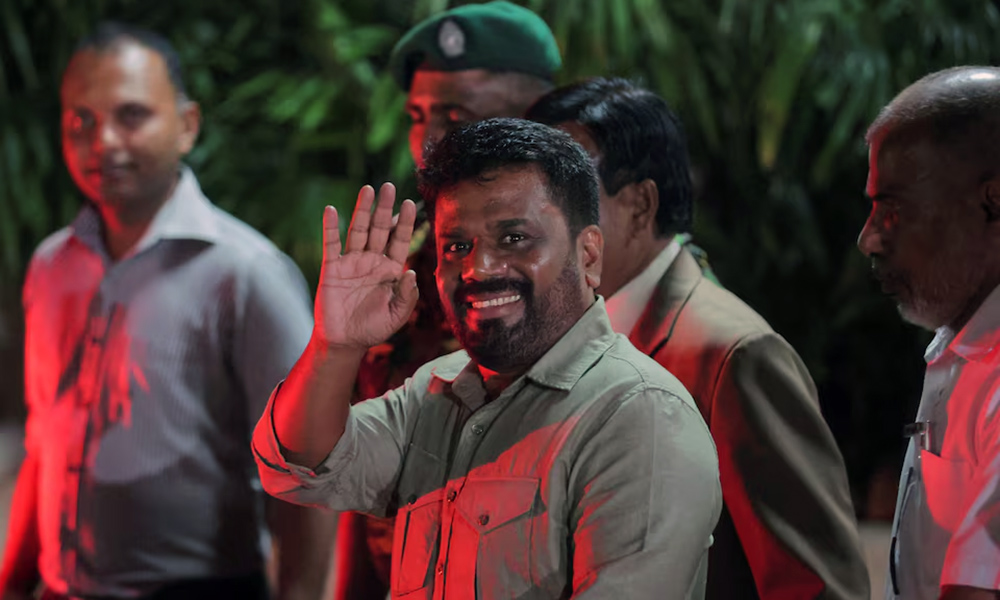
Sri Lankans elected Marxist-leaning Anura Kumara Dissanayake as new president on Sunday, putting faith in his pledge to fight corruption and bolster a fragile economic recovery following the South Asian nation’s worst financial crisis in decades, Reuters reported.
Dissanayake, 55, who does not possess political lineage like some of his rivals in the presidential election, led from start to finish during the counting of votes, knocking out incumbent President Ranil Wickremesinghe and opposition leader Sajith Premadasa.
“We believe that we can turn this country around, we can build a stable government… and move forward. For me this is not a position, it is a responsibility,” Dissanayake told reporters after his victory which was confirmed after a second tally of votes.
The election was a referendum on Wickremesinghe, who led the heavily indebted nation’s fragile economic recovery from an economic meltdown but the austerity measures that were key to this recovery angered voters. He finished third with 17% of the votes, read the report.
“Mr. President, here I handover to you with much love, the dear child called Sri Lanka, whom we both love very dearly,” Wickremesinghe, 75, said in a statement conceding defeat.
Dissanayake polled 5.6 million or 42.3% of the votes, a massive boost to the 3% he managed in the last presidential election in 2019. Premadasa was second at 32.8%.
It was the first time in the Indian Ocean island’s history that the presidential race was decided by a second tally of votes after the top two candidates failed to win the mandatory 50% of votes to be declared winner.
Under the electoral system, voters cast three preferential votes for their chosen candidates. If no candidate wins 50% in the first count, a second tally determines the winner between the top two candidates, using the preferential votes cast, Reuters reported.
About 75% of the 17 million eligible voters cast their ballots, according to the election commission.
This was the country’s first election since its economy buckled in 2022 under a severe foreign exchange shortage, leaving it unable to pay for imports of essentials including fuel, medicine and cooking gas. Protests forced then-President Gotabaya Rajapaksa to flee and later resign.
Dissanayake presented himself as the candidate of change for those reeling under austerity measures linked to a $2.9 billion International Monetary Fund bailout, promising to dissolve parliament within 45 days of taking office for a fresh mandate for his policies in general elections.
“The election result clearly shows the uprising that we witnessed in 2022 is not over,” said Pradeep Peiris, a political scientist at the University of Colombo.
“People have voted in line with those aspirations to have different political practices and political institutions. AKD (as Dissanayake is popularly known) reflects these aspirations and people have rallied around him.”
Dissanayake has worried investors with a manifesto pledging to slash taxes, which could impact IMF fiscal targets, and a $25 billion debt rework. But during campaigning, he took a more conciliatory approach, saying all changes would be undertaken in consultation with the IMF and that he was committed to ensuring repayment of debt, read the report.
Buttressed by the IMF deal, Sri Lanka’s economy has managed a tentative recovery. It is expected to grow this year for the first time in three years and inflation has moderated to 0.5% from a crisis peak of 70%.
But the continued high cost of living was a critical issue for many voters as millions remain mired in poverty and many pinned hopes of a better future on the next leader.
Dissanayake ran as a candidate for the National People’s Power alliance, which includes his Marxist-leaning Janatha Vimukthi Peremuna party.
Although JVP has just three seats in parliament, Dissanayake’s promises of tough anti-corruption measures and more policies to support the poor boosted his popularity.
He will have to ensure Sri Lanka sticks with the IMF programme until 2027 to get its economy on a stable growth path, reassure markets, repay debt, attract investors and help a quarter of its people out of poverty.
“Root cause for the downfall of this country is bad management. We have a strong feeling if we have a good manager to rule this country… we can be successful in future,” said Janak Dias, 55, a real estate businessmen.
Regional
Hamas studies US ‘bridge’ proposal for truce as Israel escalates return to war
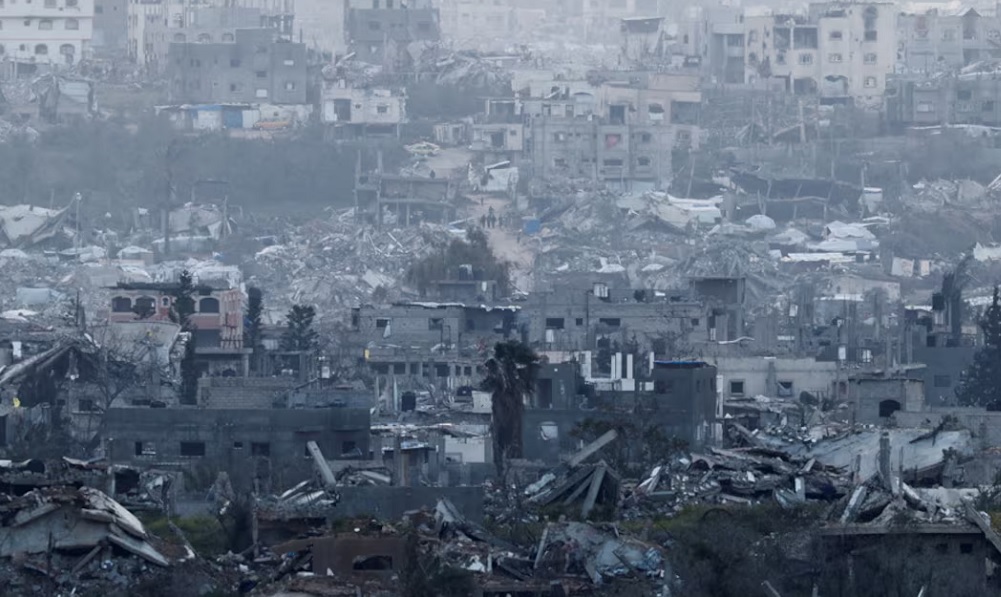
Hamas said on Friday it was reviewing a U.S. proposal to restore the Gaza ceasefire as Israel intensified a military onslaught to press the Palestinian militant group to free remaining Israeli hostages.
U.S. special envoy Steve Witkoff’s “bridge” plan, presented last week, aims to extend the ceasefire into April, beyond the holidays of Ramadan and Passover, to allow time for negotiations on a permanent cessation of hostilities, Reuters reported.
Three days after Israel effectively abandoned the two-month-old truce, Israeli Defence Minister Israel Katz said the military was intensifying its air, land and sea strikes and would move civilians to the southern part of Gaza.
Katz said Israel would continue its campaign until Hamas released more hostages and was totally defeated. Israeli airstrikes inflicted serious damage on Hamas this week, killing its Gaza government chief and other top officials.
But Palestinian and Israeli sources say Hamas has shown it can absorb major losses and still fight and govern.
Hamas said it was still debating Witkoff’s proposal and other ideas, with the goal of reaching a deal on prisoner releases, ending the war and securing a complete Israeli military withdrawal from the Gaza Strip.
A Palestinian official, speaking on condition of anonymity, told Reuters that Egypt also put forward a bridging proposal, but Hamas had yet to respond. The official declined to provide details of the plan, which he said was under consideration.
Two Egyptian security sources said Egypt had suggested setting a timeline for the release of the remaining hostages alongside a deadline for a full Israeli pullout from Gaza with U.S. guarantees.
The sources said the U.S. had signalled initial approval while Hamas’ and Israel’s responses were expected later on Friday.
A first phase of the truce ended at the start of this month, but Israel and Hamas could not agree on terms for launching the second phase. Hamas delayed further hostage releases and Israeli military action then resumed.
After two months of relative calm, Gazans were again fleeing for their lives under Israel’s new, all-out air and ground campaign, accompanied by another halt to aid deliveries.
Katz said the longer Hamas refused to free remaining hostages, the more territory it would lose. Of the more than 250 people originally seized in Hamas’ October 2023 attack on Israel, 59 remain in Gaza, 24 of whom are thought to be alive.
US BLAMES HAMAS FOR RESUMPTION OF ISRAELI ONSLAUGHT
Israeli airstrikes on Tuesday killed more than 400 Palestinians, one of the deadliest days of the 17-month-old war, and there has been scant let-up since.
On Friday, 13 people died. This included 11 people, among them six children, killed in Israeli airstrikes on houses in the Tuffah district of Gaza City in the enclave’s north, local health authorities said.
Two people were killed by tank fire in Abassan near Khan Younis in the south, according to Palestinian medics.
Hours later, the Israeli military said it had intercepted two projectiles from northern Gaza after alerts were activated in the Israeli city of Ashkelon.
Hamas’ armed wing claimed the attack, saying it was responding to Israeli “massacres against civilians” in Gaza.
Israel’s military reported it also intercepted a missile fired from Yemen after warning sirens sounded in multiple areas of Israel.
The Israeli military said it had killed the head of Hamas military intelligence in southern Gaza on Thursday. There was no immediate comment from Hamas.
The United States told the U.N. Security Council that Hamas was to blame for the deaths since hostilities resumed.
“Hamas bears full responsibility for the ongoing war in Gaza and for the resumption of hostilities. Every death would have been avoided had Hamas accepted the bridge proposal that the United States offered last Wednesday,” acting U.S. ambassador Dorothy Shea told the council.
The United Nations’ Palestinian relief agency UNRWA, one of the largest providers of food aid in Gaza, said it only had enough flour to distribute for the next six days.
“We can stretch that by giving people less, but we are talking days, not weeks,” UNRWA official Sam Rose told reporters in Geneva by video link from Gaza.
The humanitarian situation in Gaza was once again alarming, UNRWA said.
“Six of 25 bakeries that the World Food Programme were supporting had to close down,” Rose added.
“This is the longest period since the start of conflict in October 2023 that no supplies whatsoever have entered Gaza. The progress we made as an aid system over the last six weeks of the ceasefire is being reversed.”
Israel’s blockade has pushed up prices of fuel and essential foods, forcing many to ration their meals.
The war began after Hamas militants attacked Israeli communities near the Gaza border on October 7, 2023, killing 1,200 people, according to Israeli tallies.
More than 49,000 Palestinians have been killed in the ensuing conflict, according to Gaza’s health authorities, with much of the densely populated territory reduced to rubble.
Regional
Iran’s leader says Yemen’s Houthis act independently, warns against US action
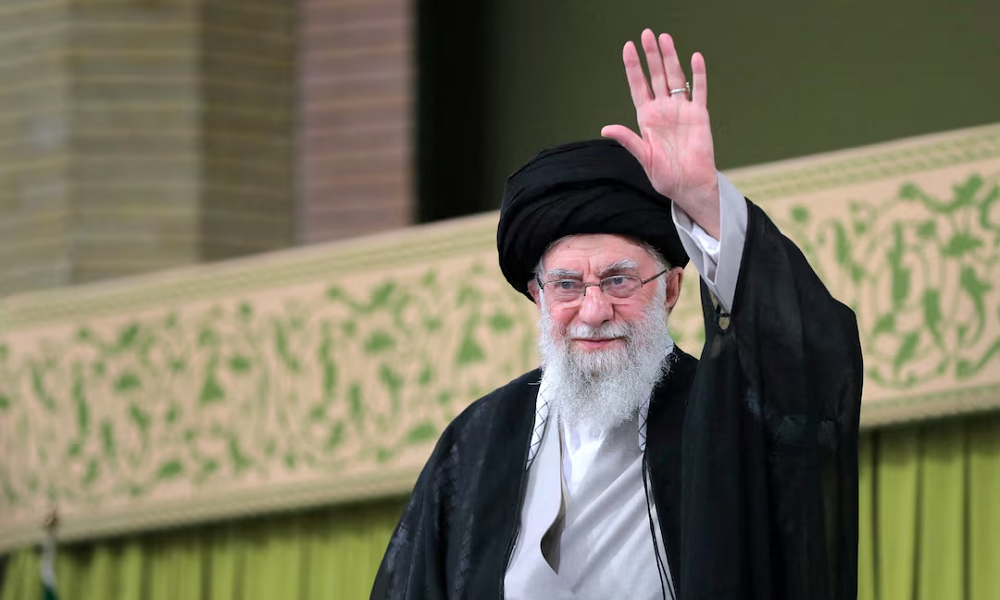
Iran’s Supreme Leader Ayatollah Ali Khamenei said on Friday that Tehran does not need proxies in the region and that Yemen’s Houthis, who are among the groups in the Middle East that Iran is aligned with, act on their own motivations.
U.S. President Donald Trump said on Monday he would hold Iran responsible for any attacks carried out by the Houthis, as his administration expanded the biggest U.S. military operation in the Middle East since he returned to the White House.
Over the years, Iran has been aligned with groups across the region that describe themselves as the “Axis of Resistance” to Israel and U.S. influence.
Those groups include Hamas, Lebanon’s Hezbollah and various Shi’ite armed groups in Iraq.
Americans, said Khamenei, “make a big mistake and call regional resistance centres Iranian proxies. What does proxy mean?”
“The Yemeni nation has its own motivation and the resistance groups in the region have their own motivations. Iran doesn’t need proxies,” Khamenei said.
“They issue threats,” added Khamenei, but “we have never started a confrontation or conflict with anyone. However, if anyone acts with malice and initiates it, they will receive severe slaps.”
Experts on Yemen, where the Houthis expanded control during years of civil war, say the group seems mainly motivated by its domestic concerns and support base.
(Reuters)
Regional
At least 91 killed in Gaza as Israel abandons ceasefire, orders evacuations
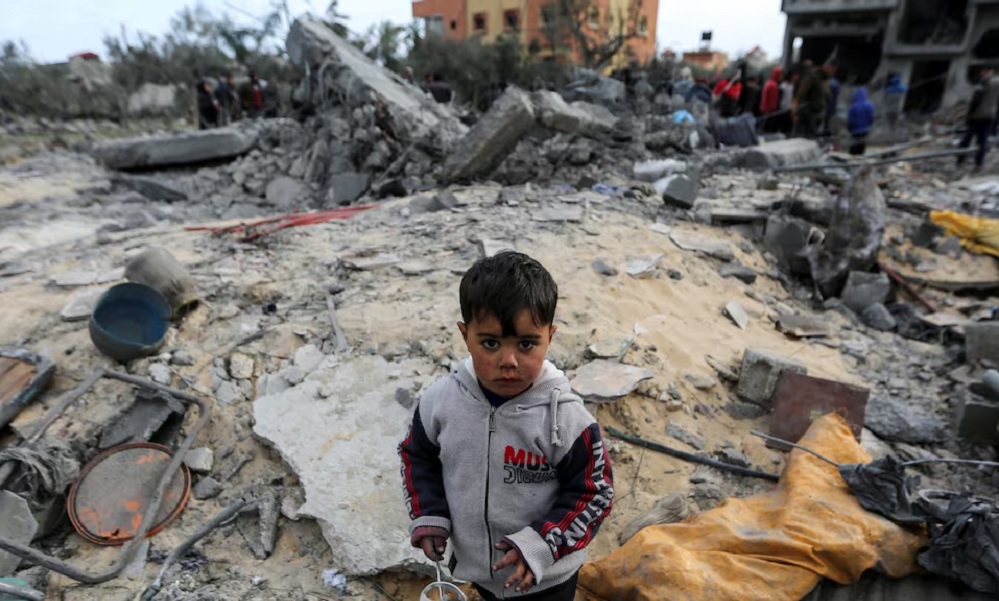
At least 91 Palestinians were killed and dozens wounded in airstrikes across Gaza on Thursday after Israel resumed bombing and ground operations, the enclave’s health ministry said, effectively ditching a two-month-old ceasefire.
After two months of relative calm, Gazans were again fleeing for their lives after Israel effectively abandoned a ceasefire, launching a new all-out air and ground campaign against Gaza’s dominant Palestinian militant group Hamas, Reuters reported.
Israeli aircraft dropped leaflets on residential neighbourhoods, ordering people out of Beit Lahiya and Beit Hanoun towns in the north, the Shejaia district in Gaza City and towns on the eastern outskirts of Khan Younis in the south.
Late on Thursday, Israel’s military said it had begun ground operations in the Shaboura district of Gaza’s southernmost city Rafah, which abuts the Egyptian border.
“War is back, displacement and death are back, will we survive this round?” said Samed Sami, 29, who fled Shejaia to put up a tent for his family in a camp on open ground.
A day after sending tanks into central Gaza, the Israeli military said on Thursday it had also begun conducting ground operations in the north of the densely populated enclave, along the coastal route in Beit Lahiya.
Hamas, which had not retaliated during the first 48 hours of the renewed Israeli assault, said its fighters fired rockets into Israel. The Israeli military said sirens sounded in the centre of the country after projectiles were launched from Gaza.
Some Gazans said there were no signs yet of preparations by Hamas on the ground to resume fighting. But an official from one militant group allied to Hamas, who asked not to be identified, told Reuters on Thursday that fighters, including from Hamas, had been put on alert awaiting further instructions. Fighters had also been told to stop using mobile phones.
With talks having failed to bridge differences over terms to extend the ceasefire, the military resumed its air assaults on Gaza with a massive bombing campaign on Tuesday before sending soldiers in the day after.
HUNDREDS DEAD
It said on Thursday that its forces had been engaged for the past 24 hours in what it described as an operation to expand a buffer zone separating the northern and southern halves of Gaza, known as the Netzarim corridor.
Israel ordered residents to stay away from the Salahuddin road, Gaza’s main north-south route, and said they should travel along the coast instead.
Tuesday’s first day of resumed airstrikes killed more than 400 Palestinians, one of the deadliest days of the 17-month-old conflict, with scant let-up since then.
In a blow to Hamas as it sought to rebuild its administration in Gaza, this week’s strikes have killed some of its top figures, including the de facto Hamas-appointed head of the Gaza government, the chief of security services, his aide, and the deputy head of the Hamas-run justice ministry.
Hamas said the Israeli ground operation and the incursion into the Netzarim corridor were a “new and dangerous violation” of the ceasefire agreement. In a statement, it reaffirmed its commitment to the deal and called on mediators to “assume their responsibilities”.
For Israel, a return to full-blown war could prove complicated, some current and former Israeli officials say, amid waning public support and burnout among military reservists. Protesters accuse Netanyahu of continuing the war for political reasons and endangering the lives of remaining hostages.
A temporary first phase of the ceasefire ended at the start of this month. Hamas wants to move to an agreed second phase, under which Israel would be required to negotiate an end to the war and withdrawal of its troops from Gaza, and Israeli hostages still held there would be exchanged for Palestinian prisoners.
Israel has offered only a temporary extension of the truce, cut off all supplies to Gaza and said it was restarting its military campaign to force Hamas to free remaining hostages.
The Israeli military said it had intercepted two missiles fired towards Israel from Yemen on Thursday, one in the early hours and the other in the evening. There were no reports of casualties. Iran-aligned Yemeni Houthi forces have occasionally fired missiles at Israel in support of Palestinians in Gaza.
‘WE DON’T WANT DEATH’
The ceasefire had allowed Huda Junaid, her husband and family to return to the site of their destroyed home to camp out in the ruins. But they were now forced to flee again, packing their few remaining belongings into a donkey cart and searching for a new place to pitch their tent near a school.
“We don’t want war, we don’t want death. Enough, we are fed up. There are no longer children in Gaza, all of our children are dead, all of our relatives are dead,” she said.
Speaking to Reuters on Thursday, a Hamas official said mediators had stepped up efforts with the two warring sides but no breakthrough had yet come.
The war began after Hamas militants attacked Israeli communities near the Gaza border in October 2023, killing 1,200 people and taking over 250 hostages, according to Israeli tallies.
More than 49,000 Palestinians have been killed in the ensuing conflict, according to Gaza’s health authorities, with much of the enclave reduced to rubble.
-
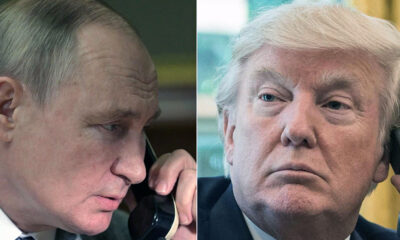
 World3 days ago
World3 days agoPutin agrees to 30-day halt on energy facility strikes in Ukraine
-

 Sport4 days ago
Sport4 days agoIPL 2025 celebrates 18 years of immense success
-
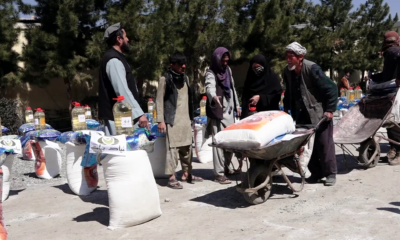
 Latest News4 days ago
Latest News4 days agoBayat Foundation helps needy families in Kabul during Ramadan
-

 Latest News3 days ago
Latest News3 days agoTorkham crossing to reopen after 25-day shutdown
-

 Latest News3 days ago
Latest News3 days agoHelmand environmental department opens new Zoo
-

 Latest News4 days ago
Latest News4 days agoAfghan-Pakistan talks to reopen Torkham border ‘end on positive note’
-
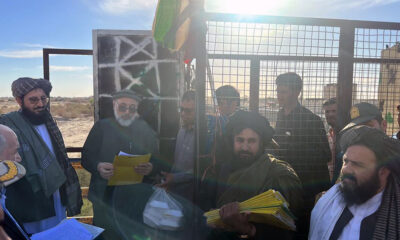
 Latest News2 days ago
Latest News2 days agoAfghan prisoners in Iran sent home
-

 Tahawol5 days ago
Tahawol5 days agoTahawol: Discussion on India, Pakistan trading accusations


